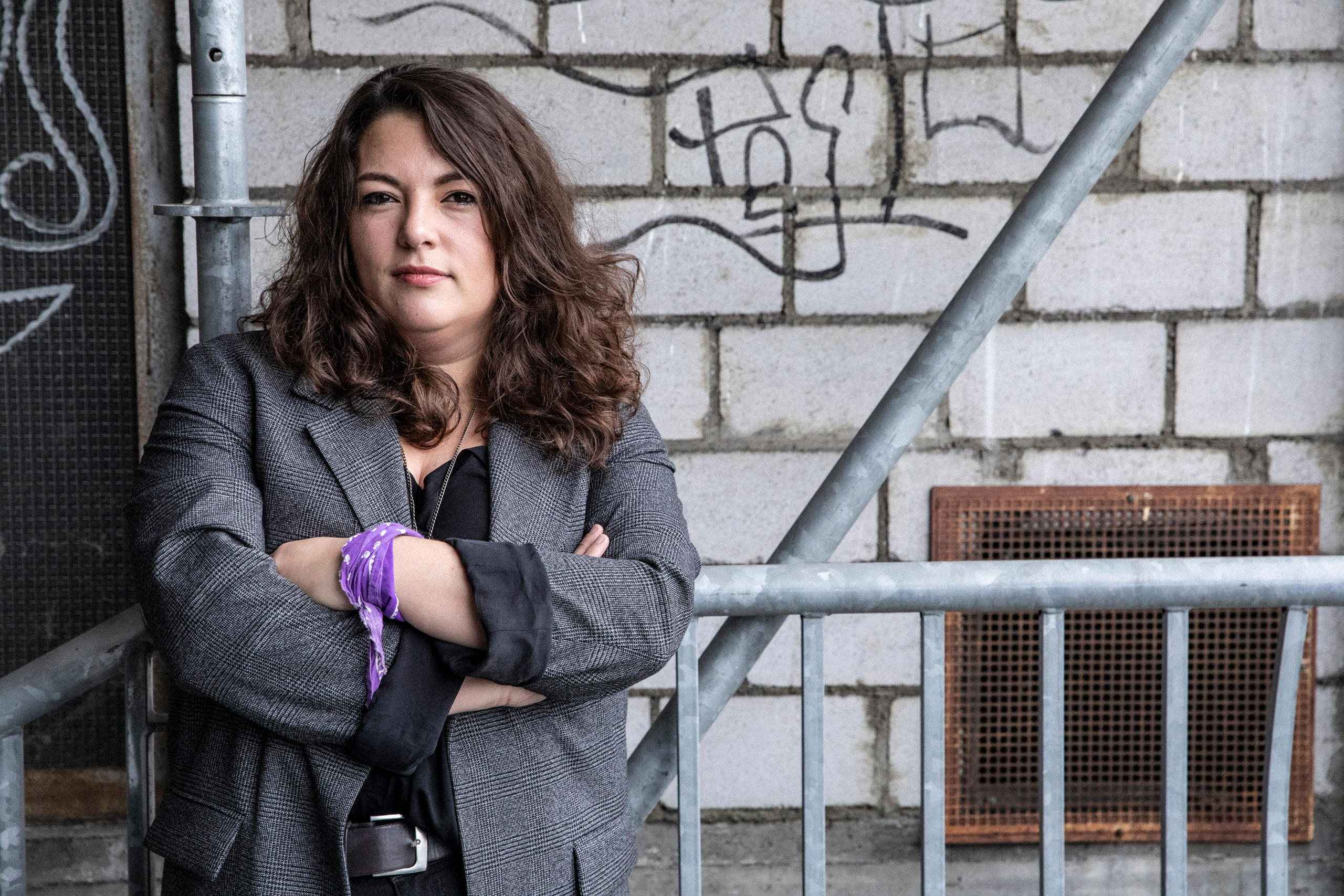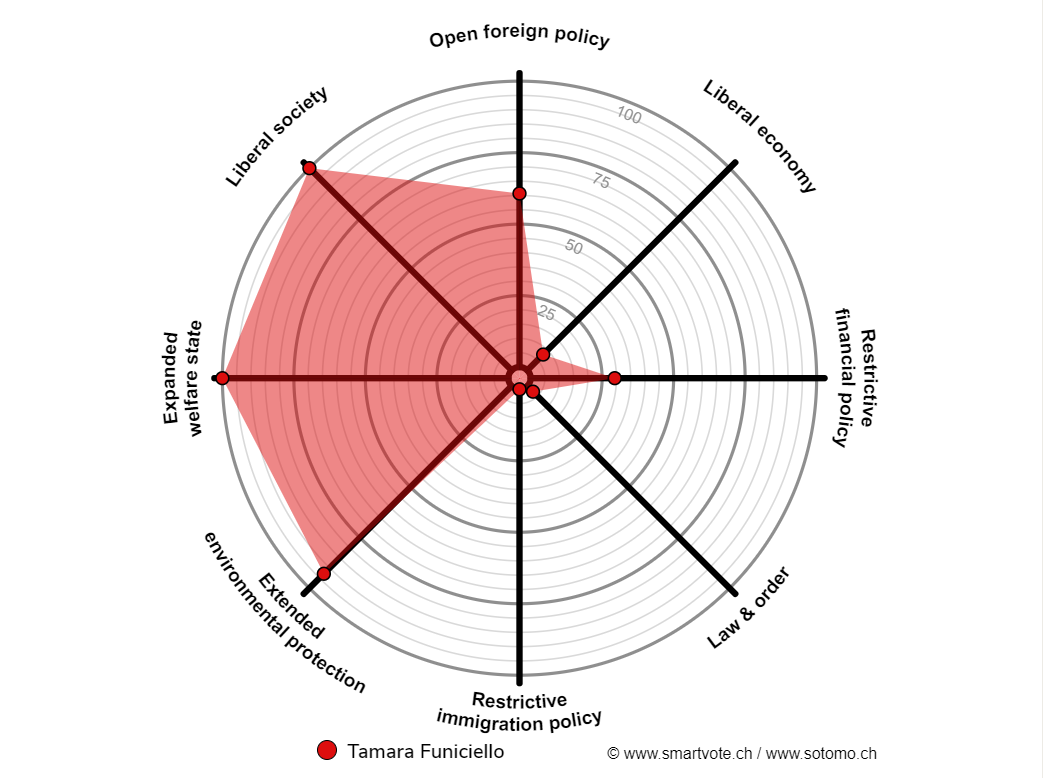
The provocateur beating a path towards equality

Tamara Funiciello, the outspoken former head of the young socialists in Switzerland, entered parliament with a bang last October. Will the 29-year-old be able to inject some radicalism into slow-moving Swiss politics?
Last October, Swiss citizens elected the most female parliament in the country’s history. Although parity has not yet been reached, women now account for 42% of members of the House of Representatives. To mark this shift, swissinfo.ch is presenting profiles of eight newly-elected parliamentarians from different parties.
The Wifag factory in Bern, once a thriving hub producing print machinery and employing over 1,000 workers, now stands empty. Only the regular clatter of the nearby Zurich train line breaks the silent obsolescence.
For newly elected Social Democrat parliamentarian Funiciello, it’s a personal and a political place.
When the plant closed its doors in 2011, her father Remigio was one of hundreds that were let go – a defining moment for the then-20-year-old, who would go on to forge a political career centred on justice for workers: first as a trade unionist, then with JUSO, the youth branch of the leftwing Social Democrats, which she led from 2016-2019.
“I experienced first-hand what it means for the father of a family to lose his job,” she tells swissinfo.ch.
Having been raised in a family that moved several times to find work, including to Sardinia (Funiciello’s father is Italian), she says she also learned that the aspirations of people everywhere are largely the same: “To make ends meet and to live a free life”.
And a decade after the Wifag closure, as part of a fresh new wave of politicians taking their seats in Bern after elections last autumn, Funiciello remains committed to the cause.
“Above all, I am a trade unionist,” she says. “Defending the rights and the conditions of workers is a central fight of mine.”

More
‘Revolution will never start in Switzerland’
Working less for equality
How she goes about defending this traditional cause, however, is less traditional.
On one hand, she proposes radical measures. For example, one of her key demands is a 25-hour work week, a slashing of work time that she says is necessary for protecting jobs in the face of growing digitalisation.
“We can’t keep working as much as we do. It’s not good for anybody – for women, for men, for the environment, not even for the economy itself,” she says.
She also rails against economic inequalities. One of her biggest successes with JUSO was the piloting of the so-called “99% initiative” – a proposal to tax the dividends and interest on wealth of the richest 1% by a factor of 1.5 compared with regular income tax.
With the 100,000 signatures needed to force a national vote on the issue handed in last April, the initiative might yet come before the Swiss people.
And although the student of history tends to mainly view politics and economics through the lens of the class struggle, she is also highly committed to more current issues of social justice.
The fuchsia band wrapped around her arm, a symbol of last summer’s women’s strike, jumps out against the drab backdrop of the Wifag factory as a striking reminder of this (see photo).
Funiciello was one of the figureheads of the historic movement, in which hundreds of thousands of women took to the streets to demand equal pay and conditions compared with their male counterparts.
The place of women in the workforce – and the fact that they continue to earn CHF108 billion ($111.3 billion) less per year than men in Switzerland – should be a more integral part of the DNA of trade unions, Funiciello says.
She also refers to unpaid work, done mainly by women, that is a forgotten part of economic statistics. “This work represents a monetary value of CHF242 million, or one-third of GDP,” she says. “We should take it into consideration.”
And finally, last year, in a long interview with Swiss newspaper the Tages-Anzeiger, Funiciello also announced that she was bisexual and in a relationship with a woman: part of her personality that she had never spoken publicly about before, but which she now thinks is necessary as parliament prepares to debate issues such as equal marriage.
On this point, she plans to advocate for the right for female-female couples to have access to assisted reproductive technology (ART) – something not foreseen by the legislation up for discussion. “Without ART, it’s not a case of ‘marriage for all’,” she says.

The leftwing populist
On the other hand, as well as her big ideas, Funiciello is also radical in her style and radical in her communication.
As head of JUSO, she was involved in various outlandish schemes: burning bras and posing naked to highlight the role of women in society, camping wild outside the villa of a right-wing parliamentarian, and handing out vibrators to raise awareness about unequal pay.
The provocative style of left-wing populism – a style she likes to call “clear” – has led to animosity from both inside and outside the political field.
Her outspokenness led to her being named “the most hated woman in Switzerland” by one Swiss newspaper, and to torrents of abuse and threats online – including threats of sexual violence.
“The amount and the severity of the comments [during my time as JUSO President] went far beyond what my male predecessors experienced,” she says.
Within politics, too, she has attracted strong reactions, particularly from the right. The youth chapter of the right-wing People’s Party called her a “big cow”, while a parliamentarian from the same party called her the “Michelin Man”.

Radical, more or less?
And beyond this – threats and insults which she speaks about openly in order to bring attention to the problem of abuse – Funiciello has even caused divisions within her own Social Democrat party, albeit for more political reasons.
In 2017, when she came out opposing the Social Democrats’ support for a proposed reform of the pension system, she was wrapped on the knuckles by party president Christian Levrat, who labelled the move “the own-goal of the century”.
Another Social Democrat parliamentarian, Roger Nordmann, accused her of “ideological blindness” and irresponsibility. He also said that her idea of a 25-hour work week is “catastrophic”.
But Funiciello makes no apologies for her style and stunts as the head of JUSO. It was not only effective, she reckons, but also a necessary spur – a “thorn in the side” – for the more consensus-focussed parent party.
Rather, the question is whether she will be able, or willing, to tone things down now that she has graduated to the august benches of the House of Representatives in Bern. Will she?
Perhaps. Despite the fact that she is “becoming more radical with age”, as she recently told Swiss public broadcaster RTS, she reckons that her experience in cantonal politics in Bern has left her with the skills needed to reach compromises.
“I know how to work in a parliament,” she says. “I’m not going to go burning bras during sessions.”
Adapted from French by Domhnall O’Sullivan, swissinfo.ch

In compliance with the JTI standards
More: SWI swissinfo.ch certified by the Journalism Trust Initiative


























You can find an overview of ongoing debates with our journalists here . Please join us!
If you want to start a conversation about a topic raised in this article or want to report factual errors, email us at english@swissinfo.ch.